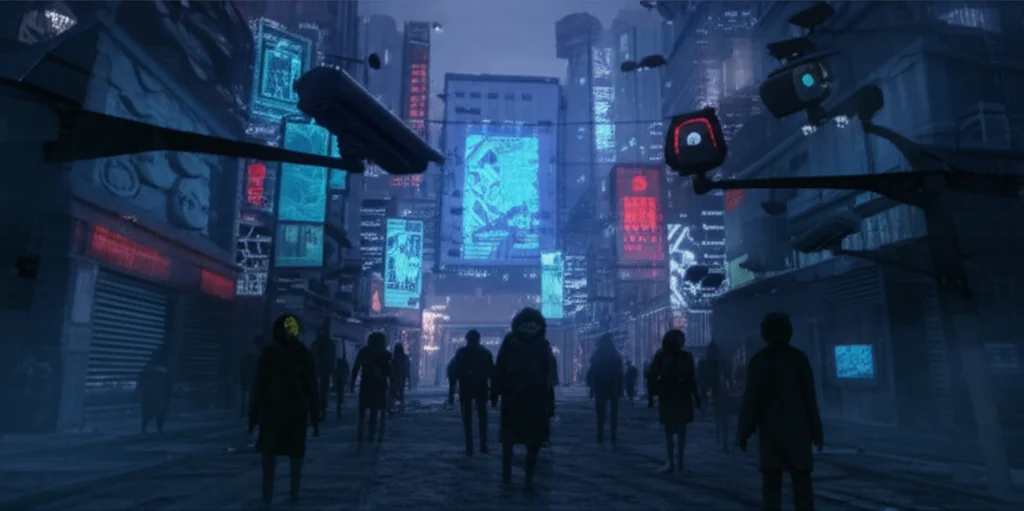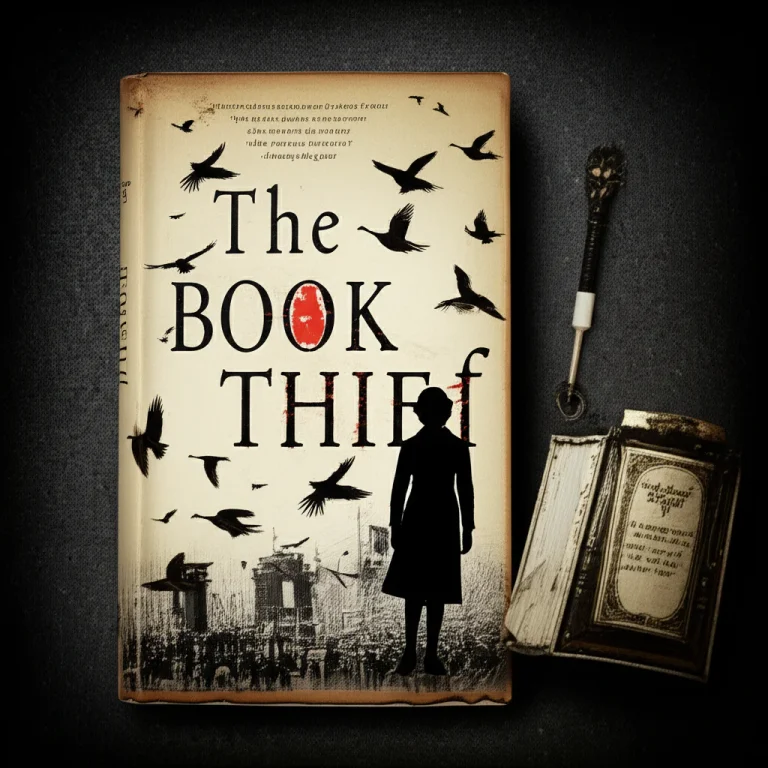Support our educational content for free when you purchase through links on our site. Learn more
11 Unforgettable 1984 Themes That Still Haunt Us in 2025 👁️

Imagine living in a world where every word you speak, every thought you have, and every memory you hold can be rewritten or erased by an all-seeing government. Sounds like science fiction? Well, that’s the terrifying reality George Orwell painted in 1984—a novel whose themes continue to resonate more than 70 years after its publication. From the omnipresent surveillance of Big Brother to the chilling manipulation of truth through Newspeak and doublethink, Orwell’s dystopia is a masterclass in warning us about the dangers of unchecked power.
In this article, we’ll unravel 11 powerful themes that make 1984 a timeless classic and a mirror reflecting our own society’s struggles with privacy, truth, and freedom. Curious about how Orwell’s vision connects to today’s digital surveillance or why the proles might hold the key to hope? Stick around—our deep dive will challenge what you think you know about this iconic novel and why it remains a must-read in 2025.
Key Takeaways
- Totalitarianism and surveillance dominate 1984, showing how absolute power destroys privacy and freedom.
- The Party’s control over language and truth through Newspeak and doublethink manipulates reality itself.
- The struggle between individual identity and collective conformity lies at the heart of Winston’s rebellion.
- Love and loyalty are weaponized and suppressed, revealing the Party’s grip on human connection.
- Themes of class struggle, memory control, and psychological torture deepen the novel’s chilling impact.
- 1984 remains profoundly relevant today, echoing in modern debates on digital privacy, misinformation, and authoritarianism.
Ready to explore the dark corridors of Oceania? Let’s dive in!
Table of Contents
- ⚡️ Quick Tips and Facts
- 📚 Unpacking Orwell’s Dystopian Vision: The Genesis of 1984 and Its Historical Echoes
- 👁️ The Chilling Core: Exploring 1984‘s Most Potent Themes
- 🌍 Why 1984 Still Resonates: Its Enduring Relevance in Our Modern World
- 🎬 Beyond the Pages: 1984‘s Impact on Pop Culture, Politics, and Everyday Language
- 🔚 Conclusion: The Chilling Echoes of Oceania in Our Own Time
- 🔗 Recommended Links: Dive Deeper into Dystopian Literature and Orwell’s World
- ❓ FAQ: Your Burning Questions About 1984 Themes Answered
- 📚 Reference Links: Our Sources and Further Reading
Here is the main content of your article, crafted by the expert team at Book Summary Review™.
⚡️ Quick Tips and Facts
Welcome, fellow book nerds, to the chilling, thought-provoking world of Nineteen Eighty-Four! Before we plunge headfirst into the dystopian nightmare of Oceania, let’s arm ourselves with some essential intel. Think of this as your survival guide to the Party’s propaganda. We’ve distilled the most crucial tidbits into a handy table because, unlike the Ministry of Truth, we believe in clarity!
| Fact Category | The Lowdown on 1984 |
|---|---|
| Author & Publication | Penned by the brilliant George Orwell and first published on June 8, 1949. |
| Genre | Dystopian Fiction, Political Fiction, Social Science Fiction. |
| Core Conflict | One man’s struggle for individuality and truth against an all-powerful totalitarian state. |
| Key Slogans | “War is Peace,” “Freedom is Slavery,” “Ignorance is Strength.” |
| Famous Terms Coined | Big Brother, Thought Police, Newspeak, doublethink, Room 101, Orwellian. |
| Main Setting | Airstrip One (formerly Great Britain), a province of the superstate Oceania, in the year 1984. |
| Protagonist | Winston Smith, a low-ranking member of the Outer Party who dares to think for himself. |
| Antagonist | The Party, personified by the ever-watchful Big Brother and the cunning O’Brien. |
📚 Unpacking Orwell’s Dystopian Vision: The Genesis of 1984 and Its Historical Echoes
So, where did this terrifying vision come from? Was George Orwell a time traveler? (We wish!) The truth is, 1984 wasn’t just a wild guess about the future; it was a powerful reflection of the past and a stark warning about the present. Orwell, a democratic socialist, was deeply disturbed by the rise of totalitarian regimes in the 20th century. He witnessed firsthand the brutal tactics of Stalinist Russia and Nazi Germany and poured that “withering indignation” into his work. The novel serves as a powerful critique of what happens when governments gain absolute power, a theme that has led to many debates and even censorship, which you can read more about in our detailed article: When Was 1984 Banned? 7 Shocking Censorship Moments (2025) 📖.
Orwell wasn’t just writing a story; he was sounding an alarm. He saw how propaganda, surveillance, and the rewriting of history were not just fictional tools but real-world weapons used to control entire populations. The constant bombings in Airstrip One? Directly inspired by the V-1 and V-2 rocket attacks on London during World War II. The chilling figure of Big Brother and his nemesis Goldstein? They have strong parallels to the power struggle between Joseph Stalin and Leon Trotsky. This book is a masterclass in Classic Literature, drawing from the grim realities of its time to create a timeless warning.
Get Your Copy of 1984 and Join the Conversation
Before we dissect the themes that make this book a must-read, you’ll want to have a copy on hand. Trust us, you’ll be highlighting passages and scribbling notes in the margins.
👁️ The Chilling Core: Exploring 1984‘s Most Potent Themes
Alright, let’s get to the juicy part. What makes 1984 so terrifyingly brilliant? It’s the themes, of course! These aren’t just abstract ideas; they are the very fabric of Oceania’s society, woven into every telescreen, every revised newspaper, and every fearful glance.
1. 🚨 The Omnipresent Eye: Totalitarianism, Surveillance, and Big Brother’s Absolute Power
At its heart, 1984 is a giant warning sign against totalitarianism. The Party isn’t just a government; it’s an all-consuming entity that controls every single aspect of life. How? Through mass surveillance. The iconic telescreens, which are essentially two-way televisions, are in every home and public space, watching and listening constantly. This creates a climate of perpetual fear where citizens police their own thoughts, knowing that even a flicker of dissent in their expression—a “facecrime”—could lead to their doom. The Party’s power is absolute, embodied by the mysterious, mustachioed figure of Big Brother, whose face is plastered everywhere with the chilling caption: “BIG BROTHER IS WATCHING YOU.”
2. 📝 Rewriting Reality: Propaganda, Doublethink, and the Manipulation of Truth
What if the truth was whatever the people in power said it was? Welcome to Oceania. The Party’s ultimate control comes from its mastery over reality itself. Winston’s job at the Ministry of Truth is a perfect example: he literally rewrites historical records to match the Party’s current narrative. Did Oceania switch allies in the perpetual war? No problem, just send the old records down the “memory hole” and create a new history.
This is all made possible by doublethink, a concept that’ll twist your brain into a pretzel. It’s the ability to hold two completely contradictory beliefs at the same time and accept both as true. For instance, knowing the past has been altered while simultaneously believing the Party’s version of the past is the absolute truth. It’s psychological manipulation on a terrifying scale, proving that if you control the information, you control the mind.
3. 👤 The Crushing of the Self: Individual Identity vs. Collective Conformity
In Oceania, you are not an individual; you are a cog in the Party machine. The novel is a heartbreaking exploration of the struggle between the individual and the collective. The Party actively persecutes any form of personal identity or independent thought, labeling it “thoughtcrime.” Winston’s rebellion begins with a deeply personal act: buying a diary to record his private thoughts. This simple act is a capital offense because it creates a record of his own reality, separate from the Party’s. His entire journey is a desperate attempt to hold onto his own memories, feelings, and sanity in a world that demands complete and utter conformity.
4. 💔 Love, Loyalty, and Betrayal: Suppressing Human Connection in Oceania
Why would a totalitarian state care about who you love? Because love and loyalty to another person are direct threats to the Party. The only loyalty allowed is to Big Brother. The Party systematically dismantles human connection by controlling relationships. Sex is portrayed as a disgusting “duty to the Party” for procreation only.
Winston and Julia’s secret love affair is their ultimate act of rebellion. They see their physical intimacy as a political blow against the Party’s control. But in this world, can love truly conquer all? The Party’s greatest weapon is its ability to sever these bonds. The climax in Room 101 isn’t just about physical pain; it’s about forcing Winston to betray the one person he loves, proving that in the end, the Party can break anyone.
5. 🗣️ Language as a Weapon: Newspeak and the Imprisonment of Thought
Here’s a chilling question: how can you rebel if you don’t have the words to express your rebellion? This is the terrifying logic behind Newspeak, the official language of Oceania. It’s a stripped-down version of English designed to narrow the range of thought. As the featured video in this article explains, by eliminating words like “freedom,” “justice,” and “science,” the Party makes it literally impossible to conceive of these concepts. If a word doesn’t exist, the thought behind it can’t exist either. As Winston’s colleague Syme gleefully explains, the ultimate goal is to make thoughtcrime impossible because there will be no words to express it. It’s a brilliant, insidious form of mind control.
6. 📺 The Technological Tyrant: Telescreens and the Pervasive Surveillance State
Orwell was eerily prescient about technology’s role in control. The telescreen is the ultimate symbol of the surveillance state. It’s not just a propaganda machine spewing Party rhetoric 24/7; it’s a device that watches your every move and listens to your every whisper. This constant monitoring fosters an environment of paranoia and distrust, where anyone—your neighbor, your coworker, even your own children—could be an informant for the Thought Police. ✅ This constant surveillance ensures conformity through fear. It’s a stark reminder that technology, in the wrong hands, can become a tool of oppression rather than liberation.
7. 📉 The Three-Tiered Nightmare: Class Struggle and the Proles’ Unseen Power
Oceanian society is rigidly divided into three classes:
- The Inner Party (High): The elite 2% who rule and enjoy relative luxury.
- The Outer Party (Middle): The educated workers like Winston who carry out the Party’s administrative work under intense scrutiny.
- The Proles (Low): The uneducated masses, making up 85% of the population, who are left in poverty and largely ignored.
This structure is a deliberate tool of control. The Party keeps the Outer Party and the Proles divided, preventing any alliance that could challenge their power. Winston clings to a sliver of hope: “If there is hope… it lies in the proles.” He believes that because they have retained a degree of personal freedom and humanity, they are the only ones with the potential to overthrow the Party. But are they too disorganized and unaware to ever realize their own strength? That’s one of the book’s most haunting, unanswered questions.
8. ⏳ Memory’s Erasure: The Party’s Control Over History and the Past
“Who controls the past,” ran the Party slogan, “controls the future: who controls the present controls the past.” This is one of the most profound themes in the book. The Party understands that without a connection to a real, verifiable past, people are completely untethered from reality. By constantly altering newspapers, books, and photographs, the Party ensures that its version of events is the only one that exists. Winston’s desperate search for his own memories—of his mother, of a time before the Party—is a fight to hold onto an objective truth. Without memory, there is no benchmark for comparison, and the Party’s lies become the unshakeable foundation of reality.
9. 🧠 The Ultimate Fear: Psychological Torture, Brainwashing, and Room 101
The Party’s control isn’t just external; it’s internal. The Ministry of Love (Miniluv) is where the Party perfects its methods of psychological torture and brainwashing. Their goal isn’t just to make you confess or to kill you; it’s to “cure” you. They want to break your spirit so completely that you genuinely love Big Brother.
This culminates in the infamous Room 101. It’s not a one-size-fits-all torture chamber. It contains the one thing that the prisoner fears most in the world. For Winston, it’s rats. By confronting him with his deepest, most primal fear, O’Brien forces him to betray Julia in the most visceral way possible, shattering his sense of self and his capacity for love. ❌ It’s the ultimate expression of the Party’s power: the ability to get inside your head and destroy you from within.
10. 👑 Power for Power’s Sake: O’Brien’s Philosophy and the Nature of Oppression
Why does the Party do all this? For the good of the people? To create a stable society? Nope. In a chilling monologue, O’Brien reveals the Party’s true motivation to Winston: “The Party seeks power entirely for its own sake… The object of power is power.” There is no utopian goal. The oppression, the suffering, the control—it’s not a means to an end; it is the end. O’Brien’s vision of the future is “a boot stamping on a human face—for ever.” This raw, nihilistic pursuit of absolute dominion is perhaps the most terrifying theme of all, as it strips away any pretense of a greater good.
11. 🕊️ The Flicker of Hope: Resistance, Despair, and the Human Spirit’s Last Stand
Amidst all this gloom, is there any hope? For much of the novel, Winston believes in the possibility of resistance. He finds solace in his diary, his affair with Julia, and his belief in the mythical Brotherhood, a supposed underground network dedicated to overthrowing the Party. He and Julia believe that while the Party can control their bodies and actions, “they can’t get inside you.”
Sadly, Orwell shows us that they can. The novel’s devastating conclusion sees Winston utterly broken, a hollow shell of a man who has been re-programmed to love his oppressor. And yet… the very existence of Winston’s story, the diary we are reading, suggests that the desire for freedom and truth, however faint, can never be completely extinguished. The book itself is an act of resistance, a testament to the enduring power of the human spirit to question, to remember, and to warn future generations. It’s a theme we explore in many of our Book Reviews.
🌍 Why 1984 Still Resonates: Its Enduring Relevance in Our Modern World
You might be thinking, “Okay, fascinating stuff, but it was written in 1949. Is it still relevant?” The answer is a resounding YES! In fact, it might be more relevant than ever. Every time there’s a major news story about government surveillance programs, like the NSA revelations in 2013, sales of 1984 skyrocket. When political figures use phrases like “alternative facts,” people flock to Orwell’s novel to make sense of the world.
Think about it:
- Social Media & “Truth”: We live in an age of information overload, where “fake news” can spread like wildfire and algorithms create echo chambers that reinforce our biases. The Party’s manipulation of truth doesn’t seem so far-fetched anymore, does it?
- Digital Surveillance: We carry telescreens in our pockets! Our smart devices, social media profiles, and online activities are constantly collecting data. While it’s not (yet) the Thought Police, the potential for this technology to be used for control is a very real, very Orwellian concern.
- Erosion of Language: While we don’t have an official Newspeak dictionary, the dumbing-down of public discourse and the use of political jargon to obscure meaning is a modern parallel.
1984 serves as a crucial lens through which to view our own world, urging us to be vigilant, to question authority, and to protect the truth.
🎬 Beyond the Pages: 1984‘s Impact on Pop Culture, Politics, and Everyday Language
The influence of Nineteen Eighty-Four is so immense that it has seeped into our very language. How many times have you heard something described as “Orwellian”? The term has become a universal shorthand for any policy or action that is destructive to a free and open society.
The novel has left an indelible mark on our culture:
- “Big Brother” is no longer just a character; it’s the name of a global reality TV franchise and a common term for intrusive government surveillance.
- Concepts like “thoughtcrime,” “doublethink,” and “Room 101” are frequently referenced in movies, music, and political commentary to evoke themes of oppression and psychological control.
- The book has inspired countless other dystopian works and has been adapted into several films, which we love to analyze in our Book-to-Film Adaptations section.
From David Bowie’s album Diamond Dogs to the Apple Macintosh’s iconic 1984 Super Bowl commercial, the novel’s imagery and ideas are a permanent part of our cultural landscape. It’s a testament to the story’s raw power that, decades later, it continues to shape how we talk about power, freedom, and truth.
🔚 Conclusion: The Chilling Echoes of Oceania in Our Own Time

So, what have we learned from our deep dive into Nineteen Eighty-Four? Orwell’s masterpiece is far more than a dystopian novel; it’s a timeless cautionary tale about the fragility of truth, freedom, and individuality in the face of unchecked power. From the omnipresent gaze of Big Brother to the insidious manipulation of language and memory, 1984 paints a world where human spirit and autonomy are relentlessly crushed—but never entirely extinguished.
Remember Winston’s flicker of hope in the proles? That lingering question about whether the masses can rise up remains open-ended, just like the novel’s haunting finale. Orwell doesn’t offer easy answers, but he compels us to stay vigilant. The themes we explored—totalitarianism, surveillance, propaganda, identity, and resistance—aren’t relics of the past. They echo loudly in our digital age, reminding us to guard fiercely against the erosion of truth and liberty.
If you’ve been on the fence about reading 1984, consider this your official nudge. It’s a challenging, unsettling read, but one that rewards you with profound insights into power, control, and the human condition. At Book Summary Review™, we confidently recommend it as essential reading for anyone curious about the dynamics of oppression and the resilience of hope.
🔗 Recommended Links: Dive Deeper into Dystopian Literature and Orwell’s World
Ready to own a copy or explore related works? Check out these trusted platforms:
-
Nineteen Eighty-Four by George Orwell:
Amazon | Walmart | Audible -
Brave New World by Aldous Huxley (for a comparative dystopian read):
Amazon | Walmart -
Animal Farm by George Orwell (another political allegory):
Amazon | Walmart
❓ FAQ: Your Burning Questions About 1984 Themes Answered

What are the main themes explored in 1984 by George Orwell?
1984 explores a constellation of interwoven themes, including totalitarianism, surveillance, propaganda, language control, individuality versus conformity, truth and reality manipulation, and resistance. Orwell masterfully illustrates how these themes combine to create a society where power is absolute and freedom is an illusion.
Read more about “Inside the 1984 Setting: 7 Chilling Details You Must Know 🕵️ ♂️ (2025)”
How does 1984 address the theme of government surveillance?
Orwell’s depiction of constant surveillance through telescreens and the Thought Police creates a world where privacy is obliterated. This omnipresent monitoring fosters paranoia and self-censorship, ensuring that citizens conform not just outwardly but inwardly. The novel warns of the dangers when technology becomes a tool for authoritarian control rather than liberation.
In what ways does 1984 depict the dangers of totalitarianism?
The Party’s absolute control over every aspect of life—history, language, relationships, and even thoughts—demonstrates totalitarianism’s capacity to crush human autonomy. Orwell shows that such regimes rely on fear, propaganda, and psychological torture to maintain power indefinitely, with no regard for truth or morality.
Read more about “What Is the Main Lesson of 1984? 7 Powerful Truths Revealed 📖”
What role does the theme of language and propaganda play in 1984?
Language is weaponized through Newspeak, designed to eliminate rebellious thoughts by shrinking vocabulary and simplifying concepts. Propaganda saturates every medium, rewriting history and manufacturing consent. This theme highlights how controlling language equates to controlling thought and reality itself.
Read more about “Unlocking 1984 Full Book: 15 Must-Know Facts & Insights 📖 (2025)”
How is the theme of individuality versus conformity portrayed in 1984?
Winston Smith’s struggle to maintain his personal identity against the Party’s demand for absolute conformity is central to the novel. Acts as simple as keeping a diary or engaging in forbidden love become revolutionary gestures. Orwell poignantly illustrates the psychological and physical toll of suppressing individuality.
What is the significance of the theme of truth and reality in 1984?
The Party’s manipulation of facts and history—through the Ministry of Truth and the concept of doublethink—demonstrates how controlling truth is the ultimate form of power. Orwell warns that when reality is malleable, society becomes vulnerable to oppression and deception.
Read more about “What Is the Main Plot of *1984*? Unraveling Orwell’s Dystopia 📖”
How does 1984 explore the theme of resistance and rebellion?
Resistance in 1984 is fraught with peril and ultimately tragic. Winston’s small acts of defiance symbolize the human yearning for freedom, but the Party’s brutal repression shows the overwhelming power of totalitarian control. The novel ends on a sobering note about the limits of rebellion but leaves open the enduring spark of hope.
What is the significance of Room 101 in the novel?
Room 101 represents the ultimate psychological torture chamber where prisoners face their worst fears. It symbolizes the Party’s ability to break down individual resistance by attacking the mind’s deepest vulnerabilities, ensuring total submission.
How does Orwell’s 1984 compare to other dystopian novels like Brave New World?
While 1984 depicts control through fear, surveillance, and repression, Brave New World explores control via pleasure, conditioning, and consumerism. Both warn of different paths to societal control, making them complementary studies in dystopian literature.
Why has 1984 remained relevant in modern times?
Themes of surveillance, misinformation, and authoritarianism continue to resonate in today’s digital and political climate. The novel’s warnings about the erosion of privacy and truth echo in contemporary debates about government power, media manipulation, and individual rights.
📚 Reference Links: Our Sources and Further Reading
- Nineteen Eighty-Four – Wikipedia — Comprehensive overview of the novel’s plot, themes, and legacy.
- George Orwell Official Website — Author biography and resources.
- Secker & Warburg — Original publisher of 1984.
- Library of Congress — Historical context and archival materials related to Orwell’s work.
- Big Brother Watch — Contemporary organization monitoring surveillance and privacy issues, inspired by Orwellian themes.
- Classic Literature Category at Book Summary Review™ — Explore more timeless works like 1984.
- Book Reviews at Book Summary Review™ — In-depth analyses of related political and dystopian novels.
We hope this deep dive into 1984’s themes has sparked your curiosity and sharpened your critical eye. Remember, the fight for truth and freedom is ongoing—both on the page and in the world around us. 📚✨



